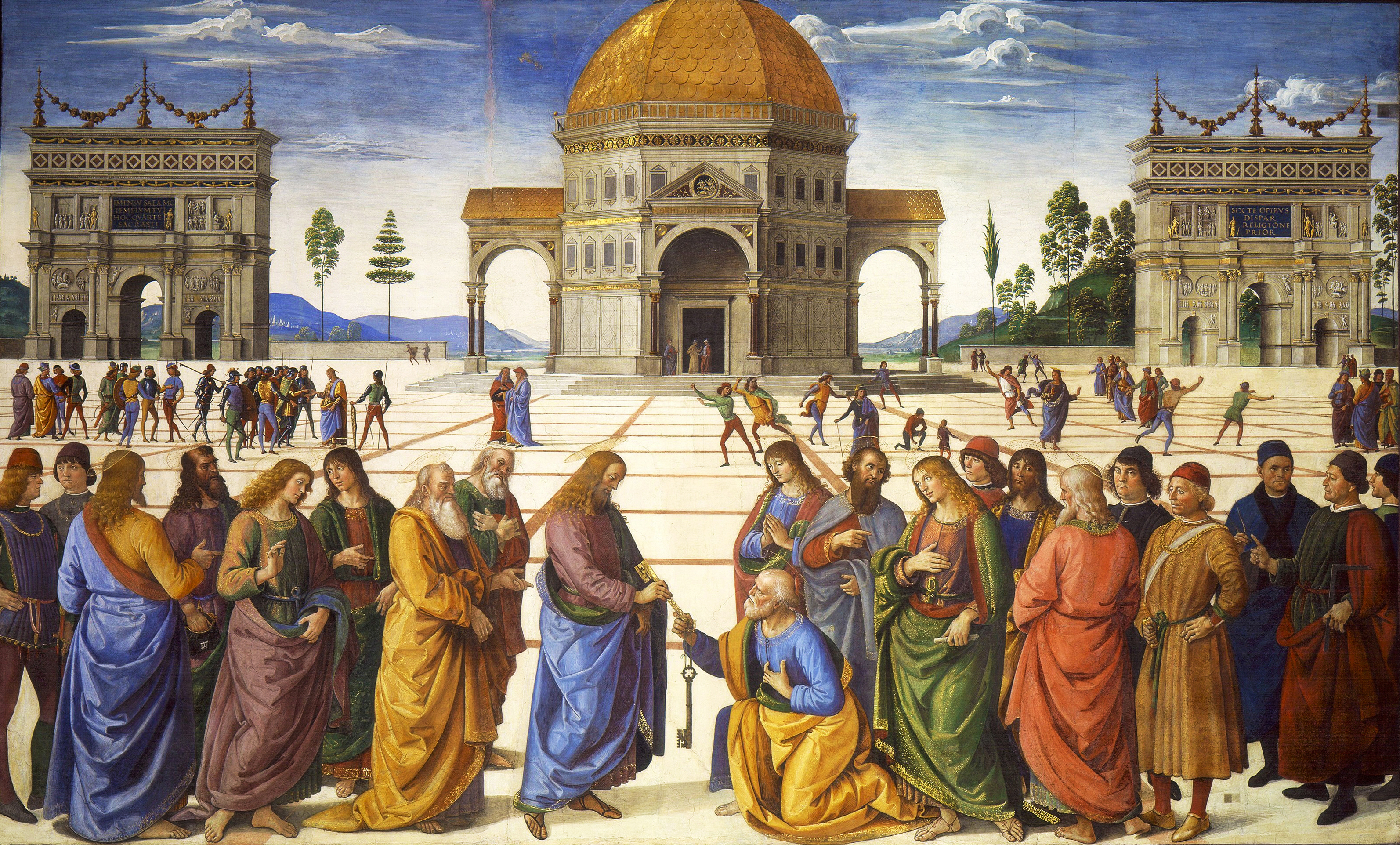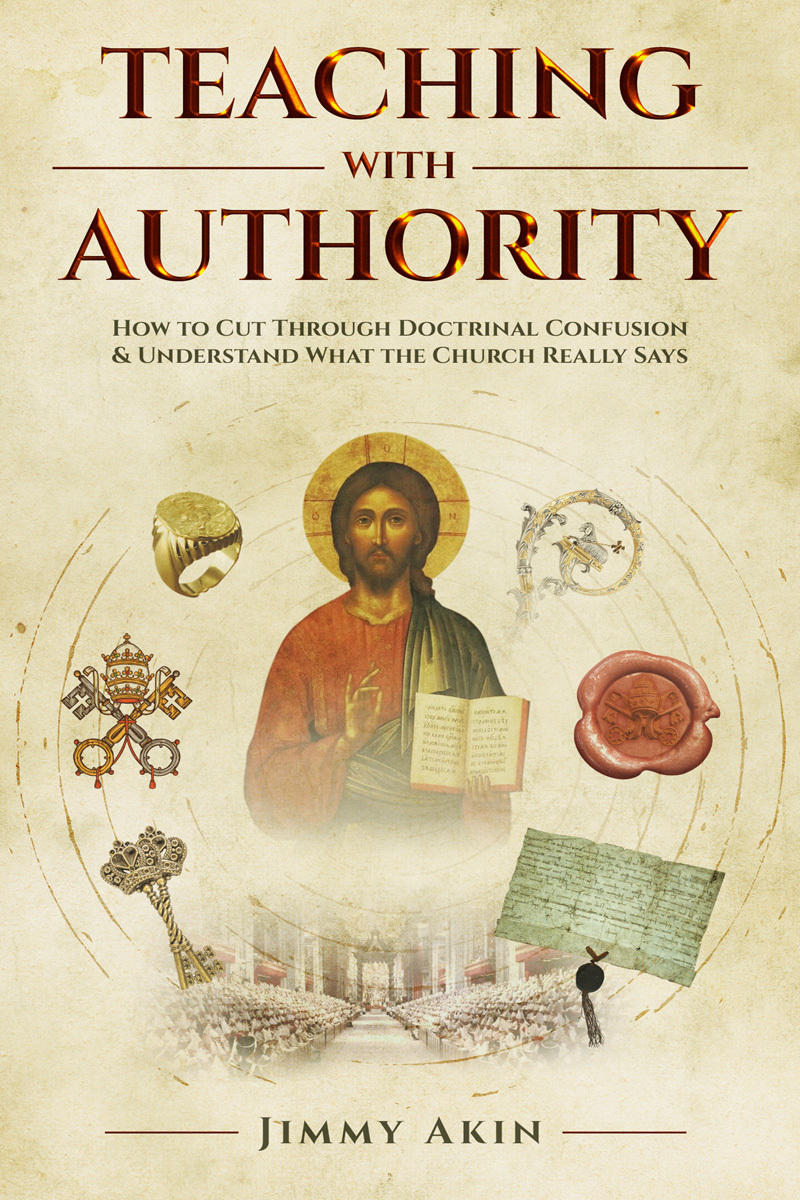
-“Christ Giving the Keys to St Peter”, Pietro Perugino, 1481-1482, fresco, Sistine Chapel, 330 cm × 550 cm (130 in × 220 in), please click on the image for greater detail
“What Does Teaching Have to Do with Authority?
We live in an age skeptical of authority. “Think for yourself” is a standard piece of advice, and slogans like “Question authority” appear on bumper stickers, buttons, and T-shirts. Following crises like the Vietnam War, Watergate, Iran-Contra, and other scandals, trust in government officials is at a historic low.
In the twentieth century, an age of radical individualism began, and even if 1960s sayings like “Do your own thing” have passed from the scene, the idea that individuals should make up their own minds about what they should do and believe has remained. The rise of modern science contributed to the anti-authoritarian attitude of our day. Scholars are not supposed to just tell us what to believe. Instead, they should provide evidence supporting the views they endorse.
Between science, individualism, and scandals involving authority figures, moderns are skeptical of authority, and that includes the connection between authority and teaching. People today hold that if a teaching is true, we should be able to produce reasons for it and should not simply accept it on someone’s “authority.”
Jesus Shares Authority with the Church
Although Jesus’ authority as the Son of God is unique to Him, He chose to associate human beings with His mission and gave them a share of authority. Thus when He appoints the Twelve, we read:
‘And He called to Himself His twelve disciples and gave them authority over unclean spirits, to cast them out, and to heal every disease and every infirmity.’ (Matt. 10:1).
The authority He shared was not just that to work miracles. The twelve disciples were His students (that’s what “disciple” means), and He prepared them to become teachers and sent them on preaching missions:
“These twelve Jesus sent out, charging them, “Go nowhere among the Gentiles, and enter no town of the Samaritans, but go rather to the lost sheep of the house of Israel. And preach as you go, saying, ‘The kingdom of heaven is at hand!’”(Matt. 10:5-7).
Later, when sending out an even larger group, He underlined the teaching authority He had given them, stating:
‘He who hears you hears Me, and he who rejects you rejects Me, and he who rejects Me rejects Him who sent Me.’ (Luke 10:16).
Jesus also gave the Twelve the authority to govern His Church. He first gave Peter the authority “to bind and loose” (Matt. 16:19), and later He shared this with the other disciples (Matt. 18:18).
As the Church grew, authority to teach and govern was transmitted to others in the local churches.
Thus Paul writes, “God has appointed in the church first apostles, second prophets, third teachers” (1 Cor. 12:28; cf. Eph. 4:11). It is because of its teaching function that the Church serves as “the pillar and bulwark of the truth” (1 Tim. 3:15).
Similarly, there are those with governing authority in the Church. The letter to the Hebrews exhorts Christians to “obey your leaders and submit to them; for they are keeping watch over your souls, as men who will have to give account” (Heb. 13:17; cf. 1 Thess. 5:12).
Teaching and governing authority are therefore intrinsic to the structure of the Church.”
(While I concur with the author, the need to provide reasoning to the modern person is a blessing to the Church, imho. We must recall crises (“These things must come…”) have always been the impetus for the Church to greater define her teaching and doctrine, improve her catechesis, to call councils, and to initiate reform. Tragic, unpleasant, yes, but necessary. How many humans do you know who change easily? Reform quickly? Admit their shortcomings, mistakes, sins readily? Me neither, especially yours truly. Similarly, in our own lives, tragedy and crises give rise to us growing and deepening our understanding of Scripture, life’s meaning, the importance of gifts and our lives. Wisdom, institutional or individual, and particularly regarding yours truly, with the exception of Solomon, seems not to be granted in a miraculous flash, but hard won. SEE = Significant Emotional Event. Then, we remember, not just in the head, but in the heart and soul, too. Brilliant. Praise Him! Praise Him, Church!!)
Love,
Matthew

